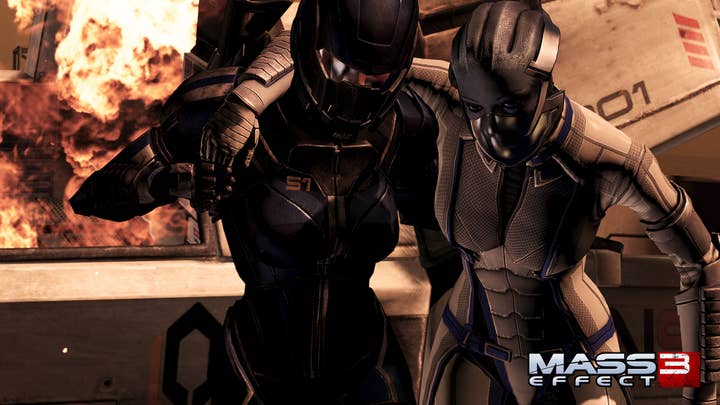Mass Effect 3's Ending Controversy Is Actually Good for the Industry
Arkadium game designer Matt Plotecher argues that it's a "watershed moment" for the medium
Take a casual stroll through the Internet looking for comments about BioWare's Mass Effect 3, and chances are you'll find a massive pile of them, almost all dealing with the game's endings. Many are sharply acerbic, a few are defensive, but in almost all cases, not much is said about the 30+ hours of gameplay mechanics. Instead, most posts about the game focus on its final endings and whether or not they are "worthy" of the Mass Effect series. This phenomenon illustrates an important shift in how video games are being viewed. The industry is moving away from talking about games as a valid form of expression, to actually demonstrating it.
First, in case you were cryogenically frozen during the past five years, the Mass Effect series is what you can call an "Action RPG" space opera. Players take the role of Commander Shepard in a large, arcing quest to save the galaxy from utter extinction. While this is not exactly a groundbreaking plot, the core parts of the series are rooted in the large amount of leeway that the player has in playing Shepard: romances can be entered into, allies can (and will) die based on your decisions, and in most interactions you have the option of allowing Shepard to be either a glimmering Paragon of pure virtue or a Machiavellian renegade of questionable moral values (or anything in between).
The day before the release of Mass Effect 3, BioWare leaked the endings to its fans and polled them to gauge their reaction. Ninety percent of users said "the endings suck." That's a pretty unambiguous statement. After about a month of similar comments from consumers, BioWare co-founder, Dr. Ray Muzyka, published a blog post explaining the studio's intention to make some changes to the offered endings.
"When we start having the same discussions that these other media forms are having about artistic integrity, author hubris and fan expectations, that's when we need to stop talking and start showing"
I'm not here to debate the actual qualities of the endings. I'm also not here to over analyze the question of "author creative control" vs. "responsibility to the audience." Rather, as I mentioned previously, I see a larger underlying issue that I think Mass Effect 3 has illustrated better than any other game to date.
Mass Effect 3 has run aground on an issue that has long plagued other media. Books, movies, and television shows have all gone through the exact same issue: what should one do when an ending fails to resonate with the audience? While many would grant the creators the right to finish the story as they see fit, many creators have also changed their mind about the original ending they made.
That is where I think the real story to this whole saga lies. The loudest complaint relating to the endings is: "My choices didn't matter."
This is a criticism that is unique to games, and to video games in particular. Players have spent over 100 hours during the past five years building up their story of Commander Shepard. The Commander might have been a male or female, straight or gay, and a paragon or a renegade. The Commander may have eradicated an entire species, reformed a criminal, or gotten completely hammered at any number of the fine bars across the galaxy. To then have all of those differences be washed away in an ending sequence where the main difference is the color palette has left the majority of fans feeling a bit cheated.
To be fair, the Mass Effect series has always been something of an exception to the standard approach to video games. Unlike popular series such as Halo or Gears of War, Mass Effect has always made the story, and your choices within it, one of the core elements to the experience. The benefit is that players have developed a much more emotional connection to the story world. The downside is that when a story element - such as the grand ending - falls flat, its reverberations can shake the very foundation of the fanbase.

Often the main lament I have heard about how society views video games is that mainstream audiences cannot, or will not, take them seriously as a form of artistic expression. The question I have heard asked which embodies this dilemma is, "Where is the video game version of Citizen Kane?" Where is an example of this medium that is going to alter the general public's perception? Never mind the fact that games like Ico and Shadow of the Colossus have, in my opinion, already set a standard for player engagement within a game. They were not as commercially successful, and as a result they have not been able to do much to erode the public stereotypes of video games just being mindless button-mashing and/or interactive demos for physics engines.
The current discussion about the Mass Effect 3 ending, however, and its lack of acknowledgement to the choices the player made throughout the trilogy, reflects a higher standard for video games from the players. Unlike most books, movies and other forms of media, video games are inherently built to allow for different choices that the player can take, and the Mass Effect series has run with this idea more than any other video game series to date. Its strong success with critics and fans (and profit margins) has shown that video games are already at the point where you can have thought-provoking fun, and robust games where the interactivity is part and parcel of the emotional investment. Once the majority of players start thinking about video games in this manner, the general public is likely not far behind.
I'm not about to say that the video game medium is ready to be embraced by the public as its own art form; that's something that really can't be fully determined until the history books are written. However, the recent ruckus over Mass Effect 3 very well may be a watershed moment in the growth of video games.
It's one thing to talk about video games being as valid forms of art and expression as other media. But when we start having the same discussions that these other media forms are having about artistic integrity, author hubris and fan expectations, that's when we need to stop talking and start showing.
